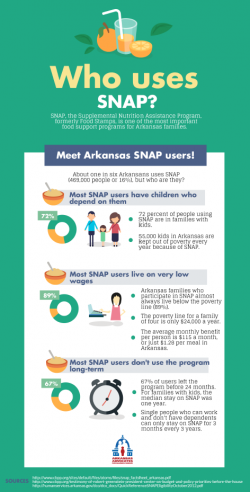
Note: This is part I of a three-part blog series on food insecurity and child hunger in Arkansas.
All kids deserve to grow up healthy and strong, with access to nutritious meals. That is why we invest in food support programs to help families make ends meet during hard times. We need to protect these important food assistance programs from unnecessary restrictions that can discourage families from building a financially secure future or applying to the program at all. SNAP (the Supplemental Nutrition Assistance Program, formerly known as Food Stamps), is the largest domestic food support program.
We need programs like SNAP because many families in Arkansas can’t always afford to put food on the table. About one in five households in Arkansas struggle to provide an adequate, nutritious diet. This is known as “food insecurity”. Food-insecure households worry about running out of food before the next paycheck, cannot afford to provide balanced meals, or eat less or skip meals entirely because there is not enough to go around. Food insecurity in Arkansas is higher than the national average (about 19 percent compared to about 14 percent) and more Arkansans are struggling to provide adequate meals now than they were in 2003. The number of food insecure households went up by 4.5 percentage points from 2003-2015, and households with low or very low food security also went up (by 1.8 percent) during that time.
SNAP is important to thousands of Arkansas families who struggle with food insecurity. Though SNAP is federally funded, states have some control over how it is administered. Unfortunately, some restrictions on the way SNAP is administered in Arkansas keep vulnerable kids from accessing the program and discourage families from building assets that will help them become financially stable. Although Arkansas has the option to waive them, we currently have unnecessary and harmful asset limits for SNAP eligibility, and legislators recently attempted to impose constitutionally questionable drug screenings for SNAP applicants.
Asset limits have it backwards; instead of helping families build assets that will aid them in achieving financial independence, they actively discourage those families from accumulating savings. Putting money away for the future is among the most important habits for long-term financial stability. Arkansas is one of only 14 states that still has asset limits for SNAP eligibility. Those limits mean that a few thousand dollars in the bank, a second car, or owning land they are living on can make a family ineligible. If Arkansas is truly serious about reducing poverty and hunger, and encouraging economic self-sufficiency, we have to raise or eliminate these asset limits.
View and download a handy infographic demonstrating who uses SNAP here!
